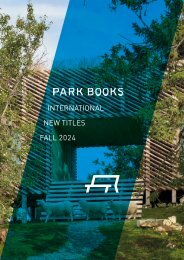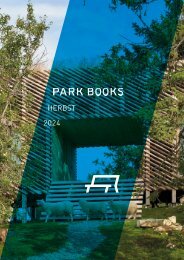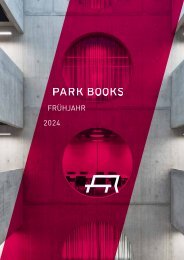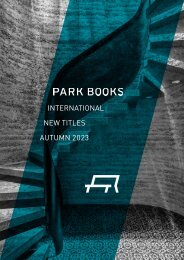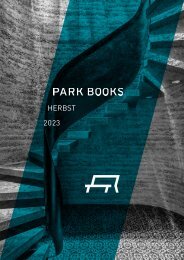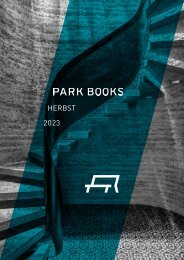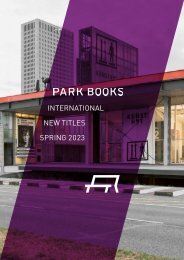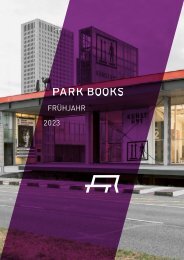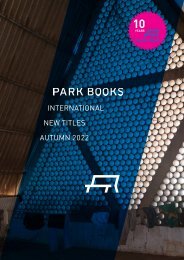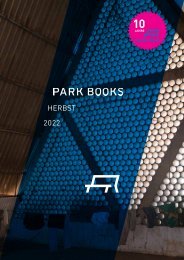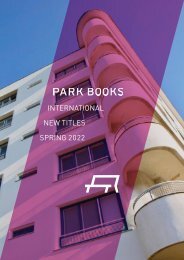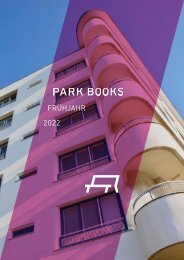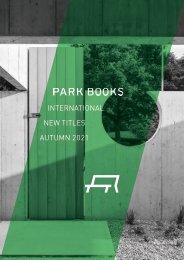Intern-new-titles-Park-Books-2019-20-lowres
New Titles Cataloug 2019/20
New Titles Cataloug 2019/20
Create successful ePaper yourself
Turn your PDF publications into a flip-book with our unique Google optimized e-Paper software.
Public space and constantly growing traffic in<br />
urban areas and resulting conflicting uses and<br />
trade-offs are highly topical in contemporary<br />
urban design discourse<br />
Offers creative strategies for the resolution<br />
of such conflicts and for the transformation of<br />
traffic space into truly public space<br />
Combines research findings and theory with<br />
concise advice based on case studies<br />
Public space is an essence of urban life, of a city’s living quality. Transforming space<br />
occupied by the increasingly dense traffic in urban areas is the most effective way to increase<br />
the quantity and quality into truly public space in cities and larger metropolitan<br />
areas. Any such increase must start with ensuring a balance between the various uses<br />
of space: more room for pause and the slow traffic of pedestrians and cyclists, less for<br />
handling of goods and the faster, passive mobility by car.<br />
This book introduces <strong>new</strong> approaches and instruments to improve actual designs as<br />
well as the planning process, outlining creative strategies rather than a rigid set of<br />
rules.<br />
Aglaée Degros, Stefan Bendiks<br />
Traffic Space is Public Space<br />
A Handbook for Transformation<br />
Paperback<br />
approx. 240 pages, 110 color and<br />
<strong>20</strong> b/w illustrations<br />
17 × 24 cm (6¾ × 9½ in)<br />
978-3-03860-165-4 English / German<br />
ISBN 978-3-03860-165-4<br />
Aglaée Degros is an architect and urban designer,<br />
and a founding partner of planning and<br />
research firm Artgineering in Brussels. She<br />
also teaches as a professor at the Institute of<br />
Urbanism, TU Graz.<br />
Stefan Bendiks is an architect and urban designer,<br />
and co-founder of Brussels-based planning<br />
and research firm Artgineering. He also lectures<br />
at various European universities.<br />
sFr. 39.00 | € 38.00 | £ 35.00 | $ 39.00<br />
December <strong><strong>20</strong>19</strong> (Europe) | March <strong>20</strong><strong>20</strong> (US)<br />
Explores the impact of cultural clashes caused<br />
by European colonization on the city of Fez’s<br />
urban fabric and social structure<br />
Features informative graphics, maps,<br />
photographs and proposals for architectural<br />
interventions<br />
The partition and colonization of Africa by European powers between 1881 and 1914<br />
disrupted the continent with enduring repercussions. Morocco—located at a crossroads<br />
between Sub-Saharan Africa, the Arab-Muslim Maghreb, and Mediterranean<br />
Europe—has struggled to withstand the resulting cultural and sociopolitical clashes<br />
ever since.<br />
This book looks at Morocco’s second-largest city, investigating how these clashes have<br />
marked Fez’s socioeconomic structure and urban fabric, and whether or not it offers<br />
alternative and relevant means of human association and community. It also explores<br />
questions about identity, authenticity, tradition, the globalization of culture, and the use<br />
of local resources.<br />
Harry Gugger, Sarah Barth, Augustin<br />
Clément, Alexandros Fotakis, Tiago Trigo<br />
(eds)<br />
Fez Lessons<br />
Industrious Habitat. Teaching and Research<br />
in Architecture<br />
In cooperation with Laboratory Basel (laba),<br />
EPFL, Lausanne<br />
Paperback<br />
approx. <strong>20</strong>8 pages, 150 color and<br />
<strong>20</strong>0 b/w illustrations<br />
21 × 31 cm (8¼ × 12¼ in)<br />
978-3-03860-169-2 English<br />
ISBN 978-3-03860-169-2<br />
Harry Gugger is an architect in Basel and a<br />
professor at EPFL’s School of Architecture,<br />
heading the school’s satellite studio Laboratory<br />
Basel (laba).<br />
Currently working at laba are architects Sarah<br />
Barth and Tiago Trigo as research assistants,<br />
and Augustin Clément and Alexandros Fotakis as<br />
teaching assistants.<br />
sFr. 49.00 | € 48.00 | £ 45.00 | $ 49.00<br />
November <strong><strong>20</strong>19</strong> (Europe) | March <strong>20</strong><strong>20</strong> (US)



